Summer Reading List: 5 Books for Leaders
Latest Posts
- 2024 Reading List for Leaders
(posted: 07/01/2024)The right book can be a leadership game-changer.
- Coach's Notebook: Exec Presence for Leaders
(posted: 05/08/2024)As a leader your charisma is critical. Learn how to develop it!
- New Year's Resolutions vs New Chapters
(posted: 02/01/2024)Forget New Year's...Your new chapter can begin when you are ready!
Blog Archives
Kristi posts to her site about once a month, but frequently more often. She also appears as a featured contributer on select other sites. If you would like to be notified when new blogs are posted, please subscribe to our newsletter.
If you are interested in Kristi guest posting to your site feel free to contact us.
Summer Reading List: 5 Books for Leaders
(posted: June 20th, 2018)

[All links in this post are provided as a courtesy to the reader. The reviews are my own opinions, all of the books were purchased, and I do not receive any kind of compensation if you click on a link!]
Successful leaders, and successful people in general, are readers.
Reading doesn’t just improve your knowledge, it can help fight depression, make you more confident, empathetic, and a better decision maker. It expands your world and makes you smarter.
The more you read, the better you're able to spot patterns, which helps to build those analytical thinking skills that are crucial to good leadership.
Just like going to the gym exercises your cardiovascular system, reading regularly improves memory function by giving your brain a good work out
Some high-profile leaders who are readers include:
- Bill Gates, who reads about 50 books per year, which breaks down to 1 per week
- Warren Buffet devotes about 80 percent of each day to reading
- Mark Cuban reads more than 3 hours every day
- Elon Musk is an avid reader and when asked how he learned to build rockets, he said “I read books.”
Are you convinced that it's important to make the time to read? Take a look at this year's Leaders' Summer Reading List of books I've read, enjoyed, and found useful. I'd love to hear which ones pique your interest, or your thoughts if you've already read some or all of them. Please put your thoughts in the comments, below.
Leaders: 5 Books for Your Summer Reading List, Plus a Bonus
1) Resilience: Hard-Won Wisdom for Living a Better Life, by Eric Greitens

What it's about: In a nutshell, this book is about how to build resilience in order to have the purposeful life you want. The book came out of the author's correspondence with one of his former Navy SEAL comrades, whose life after his war service was falling apart. The two wrote letters and talked nearly everyday, with Eric putting on paper his thoughts on what it takes to build resilience.
What you'll learn: Greitens makes it clear that being resilient is not easy, but it also not complicated. "The aim in life is not to avoid struggles, but to have the right ones, not to avoid worry, but to care about the right things; not to live without fear, but to confront worthy fears with force and passion." To be resilient you have to use what life throws at you to change your course and your perspective.
We all have "frontlines," our own battles and challenges, though most of us don't experience the frontlines of war. Our frontlines may be a difficult work environment, a troubled relationship, or health issues. Greitens touches on finding direction and purpose, while also pushing through adversity and learning from it. Failure and fear, reflection and happiness, practice and growth are all addressed, and more. It's the kind of book you read, then read passages out loud to others, re-read yearly, and give to people as gifts. People seem to get different things from it depending on where they are in their lives, and then find something new in it later on.
2) Start with Why: How Great Leaders Inspire Everyone to Take Action, by Simon Sinek
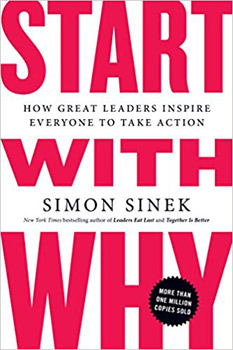
What it's about: Simon's book is in some ways the business companion to Resilience. This book is not new, but if you haven't read it, you must. Several years ago, Simon Sinek wanted to help people become more inspired at work, so he started to ask why. Why are some people and organizations more innovative, more influential, and more profitable than others? Why do some command greater loyalty from customers and employees alike? The result was this book, and his TED Talk, which has become the third most popular TED video of all time. Sinek posits that people won't truly buy into a product, service, movement, or idea until they understand the WHY behind it.
What you'll learn: Very few companies can clearly articulate why they do what they do. This goes beyond making money; Sinek points out that profit is a result of what companies do. Rather, why does your company exist? Why do you get out of bed and go to work every morning? Why should anyone care? We are drawn to leaders and organizations that are good at communicating what they believe.
Companies often put their mission statements or values up on the wall, but they are stationary nouns, not active phrases. Rather than say we value integrity, say, "Always do the right thing." So when you are working on identifying your values, make action statement out of them.
When you hire employees, hire the people who believe what you believe, who are looking in the same direction as you and your company. That's what a company culture is, a group of people who share similar beliefs and values. The role of a leader is to create an environment in which great ideas happen, and to inspire action. Martin Luther King, Jr.'s "I have dream" speech was not, "I have a plan". He lead and inspired with vision and emotion.
I use this book with my clients all the time, helping them ask the right questions, and the "why" questions, until they go deep enough to uncover their true "why".
3) The Power of Moments: Why Certain Experiences have Extraordinary Impact, by Chip & Dan Heath
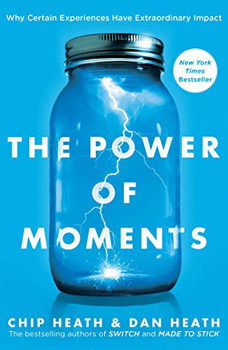
What it's about: The authors look at why some brief experiences can have a powerful effect on us, even change us, and how we can create these moments intentionally in our life and in our work. They explore why we tend to remember the best or worst moment of an experience, and the last moment, and forget the rest. They note that we "feel most comfortable when things are certain, but we feel most alive when things are not."
What you'll learn: The Heath brothers have identified four primary elements that make up our defining moments:
- Elevation. Moments that provoke transient happiness and memorable delight. If possible, add an element of surprise.
- Insight. In a few seconds or minutes, we realize something that might influence our lives for decades.
- Pride. Captures us at our best; moments of achievement, of courage.
- Connection. These moments are strengthened because we share them with others.
If we embrace these elements, we can conjure more moments that matter. What if a teacher could design a lesson that she knew her students would remember twenty years later? What if a manager knew how to create an experience that would delight customers? What if you had a better sense of how to create memories that matter for your children? And, could you use this knowledge to increase employee engagement? The book offers a lot to think about, and some exercises to help you craft "moments". There are practices and exercises to try, and suggestions that can be applied directly in the workplace.
4) The Advantage: Why Organizational Health Trumps Everything Else In Business, by Patrick Lencioni
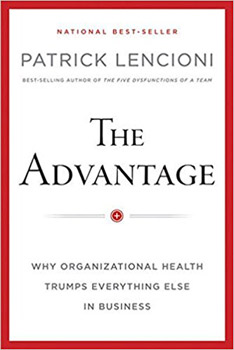
What it's about: This is one of those evergreen books that belongs in every leader's library. I pulled it out recently and re-read it in preparation for attending Pat Lencioni's first public seminar. In the book, and throughout his work, Lencioni argues that business success has everything to do with the health of the organization. In his words, "I have become absolutely convinced that the seminal difference between successful companies and mediocre or unsuccessful ones has little, if anything, to do with what they know or how smart they are: it has everything to do with how healthy they are."
What you'll learn: A healthy organization is one that has pretty much eliminated politics and confusion from its environment. As a result, productivity and morale soar, and good people almost never leave. That's pretty compelling, but it is undeniably hard, too. It requires work and discipline, though elements of it can become habit over time.
Lencioni identifies four broad disciplines that act as the foundations of organizational health. Well, one, and then three related ones: Building a cohesive leadership team, creating clarity, over-communicating that clarity once the leaders have a good grasp of it, and reinforcing clarity by ensuring that the people processes are designed to support the uniqueness of the organization.
This isn't just theory, either. The book is filled with exercises and practical suggestions so that you know what you need to do to build a healthy organization. The seminar was a wonderful way to enhance and reinforce the ideas in the book.
5) Never Split the Difference: Negotiating As If Your Life Depended On It, by Chris Voss
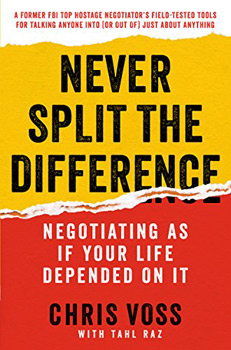
What it's about: Chris Voss was an international hostage negotiator for the FBI. He brings the same techniques to the workplace (and the home) in this book. This is one of the primary resources I recommend in my new workshop on negotiation skills for women, which I am presenting to the 2018 Wilpower group.
What you'll learn: Voss talks about the nature of negotiation, and why these techniques work, plus offers practical applications as well. There are tips everyone can use, even if they are not involved in high-stakes negotiations. His four basic tenets of negotiation are:
- Separate the person, the emotion, from the problem
- Don't get too wrapped up in the other side's position (what they are asking for) but instead, focus on their interests, why they're asking for it, so you can find out what they really want
- Work cooperatively to generate win-win options
- Establish mutually agreed upon standards for evaluating possible solutions
He also talks about the importance of listening to build rapport and trust, the importance of body language (especially mirroring), emotion, persuasion and control.
Another valuable idea from Voss is that "No" is the start of the negotiation, not the end of it. "No" could mean:
- I am not yet ready to agree
- You are making me feel uncomfortable
- I do not understand
- I don’t think I can afford it
- I want something else
- I need more info
- I want to talk it over with someone else.
"No" can be used strategically to open a way forward.
The book contains general concepts and specific suggestions, with ideas that you can practice ahead of time.
Bonus Book - The Partnership Charter: How to Start out Right with Your New Business Partnership (or Fix The One You're In), by David Gage
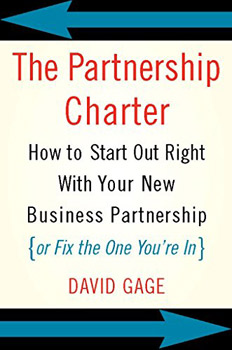
What it's about: This incredible book is not about legal partnership contracts, but about all the other things that should be addressed before any legal document is signed. The charter in the book's title is a document that clearly outlines the goals, expectations, responsibilities, and relationships of the principals. It identifies potential sources of conflict and how they will be resolved, while addressing sensitive issues such as personal styles, values, money, and power.
What you'll learn: The author asks potential business partners to take a close look at themselves and at their potential partner. Partners have a duty to one another, and the actions of one partner affect the others, so can the two of you actually pull it off and work together towards a common goal? The book is almost a workbook with all of the exercises, suggestions and practices it includes. I have now facilitated several partnership discussions with this book and I would recommend it to anyone starting a business with a friend, colleague or relative. It could also be used to help fix a troubled partnership.
Summer Reading for Personal Development
Even if you only read one book off the list, I know that you'll be energized, inspired and ready to conquer your world! Of course, if you are hungry for more great leadership reads, drop me a line. I have many more suggestions and I am always thrilled to share.
- Have you read any of the books on this year's list? If so, please share your key takeaways in the comments.
- What title would you add to the list?
- What else is on your reading list this summer?
